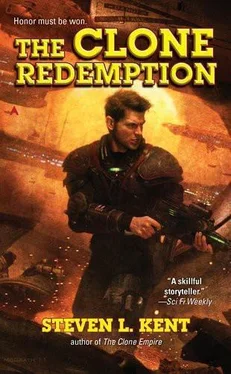Steven Kent - The Clone Redemption
Здесь есть возможность читать онлайн «Steven Kent - The Clone Redemption» весь текст электронной книги совершенно бесплатно (целиком полную версию без сокращений). В некоторых случаях можно слушать аудио, скачать через торрент в формате fb2 и присутствует краткое содержание. Жанр: Боевая фантастика, на английском языке. Описание произведения, (предисловие) а так же отзывы посетителей доступны на портале библиотеки ЛибКат.
- Название:The Clone Redemption
- Автор:
- Жанр:
- Год:неизвестен
- ISBN:нет данных
- Рейтинг книги:4 / 5. Голосов: 1
-
Избранное:Добавить в избранное
- Отзывы:
-
Ваша оценка:
- 80
- 1
- 2
- 3
- 4
- 5
The Clone Redemption: краткое содержание, описание и аннотация
Предлагаем к чтению аннотацию, описание, краткое содержание или предисловие (зависит от того, что написал сам автор книги «The Clone Redemption»). Если вы не нашли необходимую информацию о книге — напишите в комментариях, мы постараемся отыскать её.
The Clone Redemption — читать онлайн бесплатно полную книгу (весь текст) целиком
Ниже представлен текст книги, разбитый по страницам. Система сохранения места последней прочитанной страницы, позволяет с удобством читать онлайн бесплатно книгу «The Clone Redemption», без необходимости каждый раз заново искать на чём Вы остановились. Поставьте закладку, и сможете в любой момент перейти на страницу, на которой закончили чтение.
Интервал:
Закладка:
Cutter pointed to the legend at the bottom. Red lines marked courses traveled by the new generation fighter carriers. There were only two of them. Gold threads marked the paths of three new generation battleships. The computer tracked five Perseus-class battleships and three Perseus-class carriers. Even throwing in cruisers, dreadnaughts, destroyers, and frigates, the Unifieds only had fifty-eight capital ships.
“Ah, look, here comes the cavalry,” Cutter said. He did not sound worried.
The tactical display marked broadcast anomalies with Xs. Seven of them appeared. Three of them dissolved into the red lines that marked new generation fighter carriers. The other four resolved into the gold of new generation battleships.
The U.A. ships concentrated their search on an area close to Earth. Hidden by a stealth shield, we watched the U.A. ships from a half million miles away. They never came near us.
Clearly, Cutter enjoyed spying on the enemy with impunity. He laughed when ships searched in the wrong direction, tracing their flight paths with his finger and making lame jokes.
“Sixty-five ships? Do you think that’s all they have?” I asked.
“They’d have a lot more if you hadn’t stranded them at Olympus Kri,” said Cutter.
We spent another half hour watching their movements. No new ships appeared on the scene though a few ships broadcasted out. “Do you have what you need?” Cutter asked. He almost never addressed me as “sir.” From anyone else I might have taken that as a sign of disrespect but not from him.
“How close can we get to Earth without their spotting us?” I asked.
“They’re already on alert,” Cutter said, a crooked smile forming across his lips. In the time that we had been standing by the tactical display, the multicolored threads representing the various ships had knitted themselves into a fabric. “We’d be taking a risk.”
“How big a risk?” I asked.
“Those ships are traveling at thousands of miles per hour,” he said, pressing a button to expand the ledger. Now it showed single-line readouts on every ship. The battleships and destroyers traveled at a uniform fifty thousand miles per hour.
“The fighter carriers aren’t moving,” I said.
“They’re preparing to launch attack wings,” Cutter said.
“But they don’t know where we are.”
“That’s the standard procedure when you’re dealing with an invisible threat. In another minute, they will start firing particle charges.”
I stared down at the display. With their fighters launched, the Unifieds expanded their net. They had started out between the Earth and its moon; now they had spread their search beyond it.
“Particle charges?” I repeated. I thought about the rickety hull of the ship, with its many patches. “Could we withstand a direct hit?”
“Easily. They don’t use particle charges to destroy enemies; they use the charges to locate them.”
Though I did not keep current with Navy weaponry, I knew what he meant. The charges exploded in bursts of energy-seeking ionized particles that attached themselves to energy fields like the electricity in our shields. In the vacuum of space, those particles would travel thousands of miles, while techs aboard the U.A. ships traced their movements.
“What if we lowered our shields?” I asked.
“How do you feel about radiation poisoning?”
I smiled, and said, “I’m not committing suicide until I can take the Unified Authority down with me.”
CHAPTER FORTY-SEVEN
Who do you trust in a time of war?
I once had a lieutenant named Thomer with a debilitating drug addiction. He used to sit through staff meetings in a near-catatonic state staring at walls, never speaking unless he was spoken to. Against my better judgment, I kept him in place during a big showdown with the Unified Authority Marines. He fought brilliantly and saved lives.
The first time I had met Ray Freeman, I wrote him off as a thug. Now I considered him my closest friend. I needed more friends.
Freeman and I sat in an empty transport. On a ship as small as the cruiser, the transports were the only place you could go to be alone. Freeman sat in the pilot’s chair. “Have you reached Sweetwater and Breeze?” I asked as I sat down in the copilot’s chair.
“I’m here,” said Breeze. Freeman must have routed the signal to the transport’s communications system. We had an audio signal, but the video was off.
“Is Dr. Sweetwater there as well?” I asked, as we only had an audio connection. I heard him through the communications console.
“It’s just me this time. William is checking the results from the survivability survey,” he said.
Freeman sat silent, staring straight ahead through the windshield. He looked big and strong and vanquished, like an evil giant in a fairy tale who has been tricked but not yet killed.
“General, do you remember William’s mentioning the auditors that the Linear Committee has sent to oversee our work? He is leading them on quite a wild-goose chase. I think he has them counting the number of stars in the Galactic Eye.”
I thought he was joking; there were billions of stars in the Eye. When I laughed, he asked, “Why are you laughing?”
“He’s really making them count stars?” I asked. “Aren’t there billions of stars in the Galactic Eye?”
“Seventy-eight billion in the section he has given them,” Breeze said.
“They can’t count seventy-eight billion stars. It would take a lifetime.”
Freeman sat beside me, either not listening to us or not caring what we said. He stared out the window, his face impassive.
“No one is going to count that many stars,” I said.
“He told them it was an accounting irregularity,” Breeze said.
“An accounting error in the stars?” It didn’t make sense.
“He found a glitch in their programming,” Breeze said.
That caught Freeman’s attention. He stared at the communications console, and I saw the old intensity in his eyes.
“What do you mean?” I asked.
“How long have we been dead?” Breeze asked.
I did not answer.
“Am I a brain scan? Is this a simulation of the Arthur Clarke Wheel?”
“What are you talking about?” I asked, desperate, scrambling to take control of the conversation.
“Sweetwater loaded a list of stars and locations into an accounting ledger and gave it to those men. They didn’t even bother looking at the number of entries. They didn’t care that there were billions of entries. Men get overwhelmed when you hand them a ledger with seventy-eight billion entries. Computer programs begin counting without checking the volume of the work.”
“They’re government number crunchers,” I said. “They probably get paid by the line.”
“Seventy-eight billion lines?” Breeze asked. “William built a randomizing engine into the database. Every time they complete one billion lines, the engine shuffles the data and reinserts it back into the file.”
“They probably think they hit the jackpot.”
Beside me, Freeman looked up from the console and shook his head in warning. Real or not, we needed the scientists’ help. Their work could determine the future of mankind; and if Breeze shut down, Sweetwater would follow.
“Whoever programmed this simulation didn’t understand the physics of the Arthur Clarke Wheel,” Breeze said. “It uses centripetal force to create gravity instead of a generator.”
“What are you talking about?” I asked.
“I visited the control room last night. It has a gravity generator.”
“Maybe it’s there for backup,” I said. “Maybe it’s there in case something goes wrong with the rotation.”
“It’s cosmetic,” said Breeze. “I turned it off, and nothing happened.” I heard an odd tone in his voice that might have been irritation or anger.
Читать дальшеИнтервал:
Закладка:
Похожие книги на «The Clone Redemption»
Представляем Вашему вниманию похожие книги на «The Clone Redemption» списком для выбора. Мы отобрали схожую по названию и смыслу литературу в надежде предоставить читателям больше вариантов отыскать новые, интересные, ещё непрочитанные произведения.
Обсуждение, отзывы о книге «The Clone Redemption» и просто собственные мнения читателей. Оставьте ваши комментарии, напишите, что Вы думаете о произведении, его смысле или главных героях. Укажите что конкретно понравилось, а что нет, и почему Вы так считаете.












